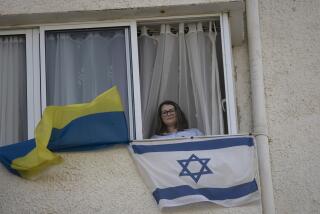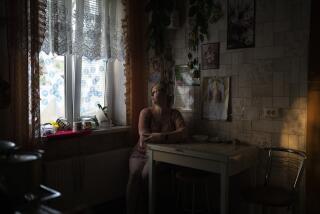In Kosovo, Faith in NATO Dying
- Share via
GRCINA, Yugoslavia — Lindita Sylmetaj trusted the promise that Western military power would make it safe to go home. Now the girl is wounded, and four members of the family she loved are dead.
Serbian soldiers fatally shot two small boys, their father and his niece in the darkness after they crossed from Albania back into Kosovo, certain that NATO’s threats to bomb had opened the mountain path for them.
Their faith was too strong, the risk too great, and a 15-year-old girl feels betrayed by a power so mighty that she can only imagine: the North Atlantic Treaty Organization.
“I blame them,” Lindita said in her family’s farmhouse Saturday, and then she paused for a deep breath. “I blame them very much. I believed in them. But now I don’t trust them anymore, not after this.”
Kosovo’s ethnic Albanian leaders want NATO to send ground troops to guarantee their people’s safety, but the allies are sticking to a strategy of military threats and diplomatic pressure.
Although repeated warnings and deadlines have helped maintain a tentative cease-fire across most of Kosovo, they haven’t stopped the dying.
Another ethnic Albanian boy was killed Saturday in central Kosovo, and witnesses blamed Serbian police deployed against separatist guerrillas in the area.
Shemsi Buzuku, 11, was shot dead while chopping firewood near Krajkovo, the Reuters news agency reported. Shemsi’s cousin, Zymer, 17, was wounded by the gunfire.
Serbian border guards also opened fire on another five refugees trying to escape into neighboring Albania early Saturday, Albania’s Interior Ministry reported.
The wounded, two children, two elderly men and a woman, were airlifted from the border village of Pogaj to a hospital in the Albanian capital, Tirana. They were in critical condition, said Aratan Bizhga, an Albanian Interior Ministry spokesman.
In Thursday’s attack, soldiers killed two boys, ages 2 and 6, a 12-year-old girl and the boys’ father. Their mother was seriously wounded and fell near Lindita.
One of the Serbian soldiers’ bullets grazed the girl’s left cheek just below her eye, and it also tore a cut along her ear. Her bruised, swollen cheek is covered with a patch of surgical gauze, stained rust-brown with dried blood.
She was in a group of 16 people, five of them adults. They had fled across the mountainous border to Albania on Sept. 20 after hearing rumors that security forces were coming to attack.
They started to think about going home again Oct. 12 after news came across their portable radio that NATO’s threats of striking with about 400 warplanes had won a peace deal in Belgrade, the Yugoslav and Serbian capital.
U.S. envoy Richard Holbrooke had persuaded Yugoslav President Slobodan Milosevic to withdraw forces from the Serbian province of Kosovo. Milosevic also agreed to start talks toward more autonomy for Kosovo, where 90% of the people are ethnic Albanians.
The Sylmetajs and their group headed for the Albanian border about 8 p.m. Wednesday, made it into Kosovo with no problem and were on the final leg of their journey when the soldiers opened fire about 4 a.m., Lindita said.
They were about a mile from their home and had stopped beside the road to check for any trouble, she said.
Lindita is certain that the group was ambushed by soldiers hiding about five yards away.
“We didn’t hear anything and didn’t see anything,” she said. “Suddenly we just heard shooting, and we all fell down. Only God saved us.”
When the soldiers finally stopped firing, they shot a flare into the night sky that cast a white light over the bloodied bodies. But they did nothing to help the wounded, Lindita said.
She had to carry her injured sister, Leonora, who later died.
Lindita’s ears still echo with the screams of a man pleading for the soldiers to stop and then yelling at them for killing his little boy.
“When he stood up with the dead baby, he shouted: ‘Look at what you have done to my son!’ ” according to Lindita. “The soldiers laughed and said, ‘Shut up, we might do the same to you.’ ”
Then he was shot dead too, she said.
The Yugoslav army claims that the returning refugees were human shields for separatist guerrillas trying to slip into Kosovo. When the soldiers ordered them to stop, the guerrillas opened fire first, an official statement said.
But the army did not offer any evidence to back up its claim, and the only people confirmed dead are a man identified as an Albanian guide and members of the Sylmetaj family: Mazzlum, 2; Muharrem, 6; Leonora, 12; and the boys’ father, Ramiz, 28.
The only people known to have been wounded are Lindita and Ramiz’s wife, Ajshe, who is receiving treatment in hospital.
The Sylmetajs died six days after NATO extended its deadline to Tuesday for Milosevic to withdraw his forces or face airstrikes.
On Saturday, the U.N. Security Council voted 13-0 to approve a resolution endorsing ground and air monitoring of an accord to end the crisis. However, as a result of pressure from Russia and China--which both abstained from voting--the resolution did not authorize any use of force if the agreement were broken or the monitors needed to be rescued.
However, Western diplomatic observers insist that the pressure on Milosevic by NATO is working, and although he still has not complied with U.N. resolutions, a tentative peace appears to be taking hold as winter nears.
Serbian security forces have removed many roadblocks and withdrawn heavy weapons. However, Western observers have spotted buildups in other areas, suggesting that Milosevic may be playing a dangerous shell game.
U.S. Gen. Wesley Clark, NATO’s commander, went to Belgrade on Saturday to remind Milosevic that the airstrikes threat still stands.
Clark and German Gen. Klaus Naumann also met with the Yugoslav army’s chief of staff, Momcilo Perisic, apparently to discuss details of the withdrawals.
Despite the risk of more fighting in Kosovo, thousands of refugees have returned to devastated villages, where they are struggling to rebuild before the snow falls.
About 10,000 ethnic Albanians are still camped out under makeshift tents of sticks and plastic, according to the Office of the U.N. High Commissioner for Refugees.
But fear of Serbian special police units still runs so deep, and the unofficial cease-fire is still so fragile that many refugees flee again soon after coming home, said Laura Boldrini, the U.N. agency’s spokeswoman.
On Thursday, U.N. workers came across 50 women and children walking along the side of the road to Vasiljevo to escape the village of Poklek.
“These people had returned to their village three weeks before,” Boldrini said. “But due to the recent increase in police presence and, they also said, tanks around the village, they decided to flee again.”
The U.N. agency’s staff found 500 newly displaced people at a camp in Nguche on Tuesday after shelling forced them to flee Trpeze.
It is not hard to understand why the Sylmetaj family was in such a hurry to get home. The Sylmetajs’ two-story farmhouse sits at the foot of a mountain, and a brook passes by their front walk.
The village is surrounded by oak forests and fields where farmers like Sylmetaj grow wheat and corn or graze cattle and sheep.
Now villagers live with the fear of retaliation from Serbian authorities, who had warned relatives of the dead to keep journalists away from the funeral.
Serbian police operate a post on the dirt road that runs down the valley from the Sylmetajs’ village. They got a good look at anyone traveling to Grcina to pay respects to Thursday’s shooting victims.
More to Read
Sign up for Essential California
The most important California stories and recommendations in your inbox every morning.
You may occasionally receive promotional content from the Los Angeles Times.













